 Back
Back
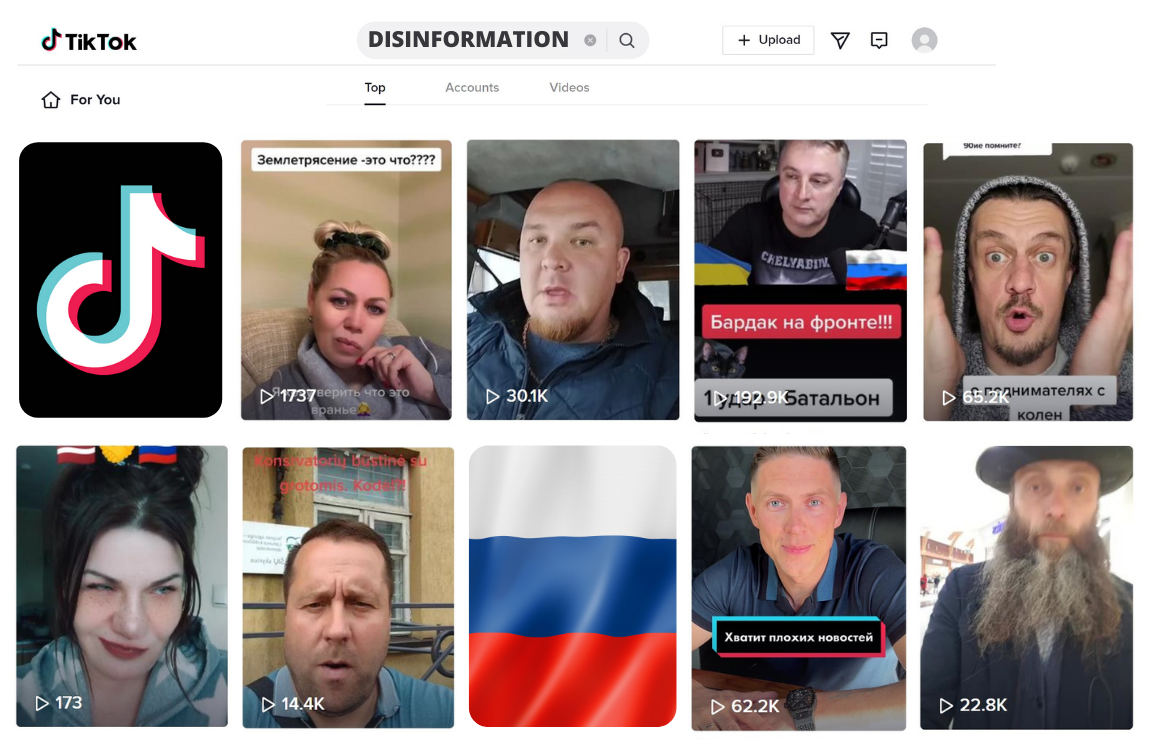
Although the number of TikTok users in the Baltic states is quite similar, the use of this platform among politicians and the reaction to the content they publish are very different in all three countries. After shutting down Kremlin’s TV channels, TikTok also has become fertile soil for Kremlin’s narratives. Latvian State Security service has already started seven criminal investigations for supporting Moscow on TikTok, while Lithuania and Estonia are taking a lighter approach, Re:Baltica’s Baltic disinformation quarterly review about the use of TikTok says.
TikTok in the politics of the Baltic States
In Latvia, over the last few years, the number of users of the Chinese-owned platform has increased four times – every fifth resident uses it. In this country, unlike in neighboring Lithuania and Estonia, TikTok is also intensively used by middle-aged people, who make up about 20 percent of a certain age group consumers. In Lithuania and Estonia, as shown by the Eurobarometer, this number is half as low.
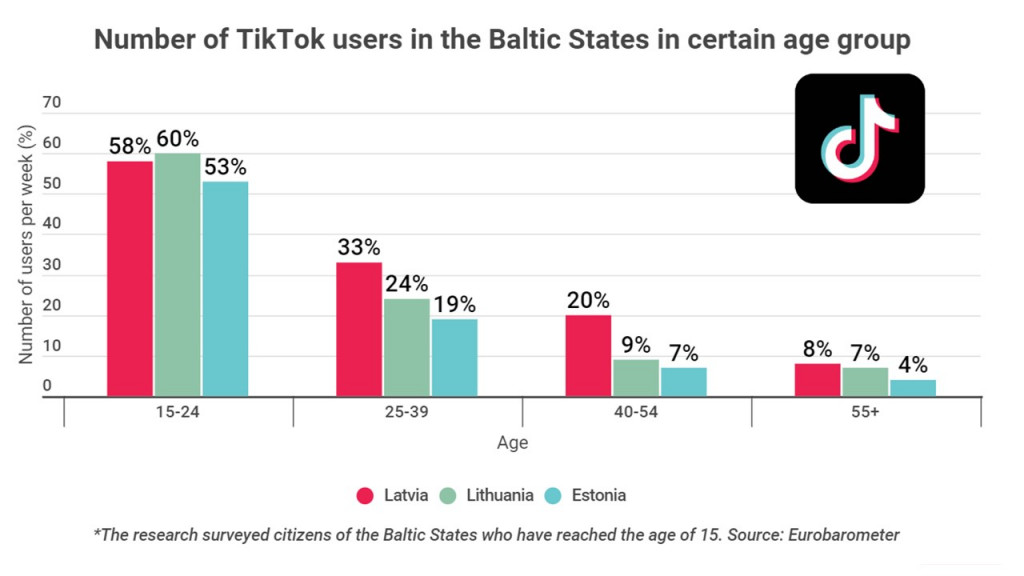
The number of TikTok users is quite similar in all three Baltic countries, but in Lithuania and Estonia the platform is hardly used for political purposes, and if it is, then only by representatives of liberal parties. In the Baltic States, the most popular platform used to reach voters remains Facebook.
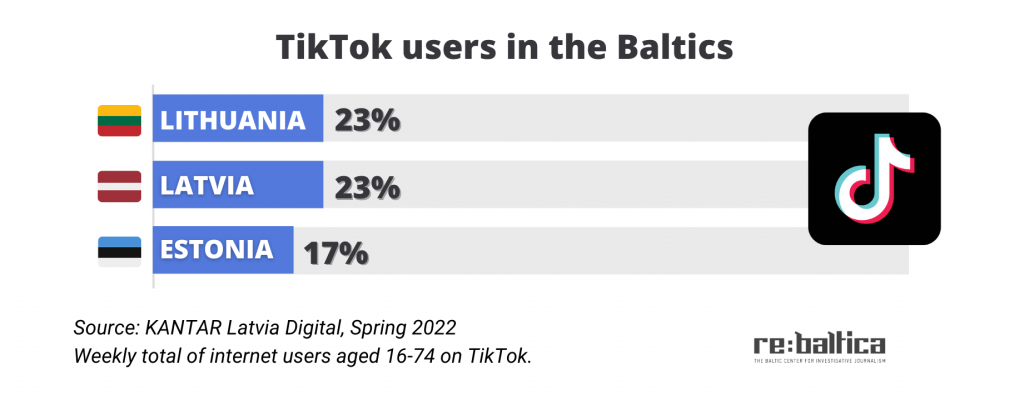
In Lithuania, only 8 out of 141 parliamentarians have TikTok accounts with more than a hundred followers. The three most popular accounts belong to representatives of the Freedom Party. The most popular users of TikTok are MP Tomas Vytautas Raskevičius (108.4 thousand likes), party founder, Minister of Economy and Innovations Aušrinė Armonaitė (107.9 thousand likes) and MP Morgana Danielė (49.8 thousand likes).
The content published by all three politicians is very similar. These are mostly political advertisements, excerpts from conferences and speeches in parliament.
Raskevičius posted 12 videos in 2022 highlighting the agenda and values of the party: passing the civil union law, the campaign against bullying and hate speech, the decriminalisation of small amounts of cannabis. Armonaitė has been even less active on the platform. She has posted eight videos about her governmental work and to show her support for Ukraine. The third most popular politician on TikTok in Lithuania is Danielė who posted 15 times during 2022.
Public relations specialist Liutauras Ulevičius says the trend is not surprising: “Their voters are TikTok users and they want to reach them (..) Politicians don’t really use TikTok to reach the older or elderly voters, because it means putting in more effort than you can get out of it.” The TikTok format—short videos with little text—is meant for emotional outbursts, not for serious discussions, says Ulevičius.
Rugilė Andrejevskytė, a mentor at the youth-founded policy monitoring network I Know What I am Choosing shares this view. “On the one hand, it is difficult for politicians to communicate via TikTok because their content doesn’t easily get a large number of views (..) On top of that, there is the TikTok format itself, which is harder to use than just creating a post on Facebook. You must hit a trend or create it. The [investment] of time and resources to create an engaging video is too high for the number of views gained. In addition, many still feel that the platform is cringe.”
For comparison, the most popular Latvian polititian Grevcova’s TikTok content has three million likes, and in Estonia—Andres Sutt has 4,3 thousand likes. In Estonia, only 2 out of 101 MPs use TikTok, but they are not very active and none of them have a large number of followers.
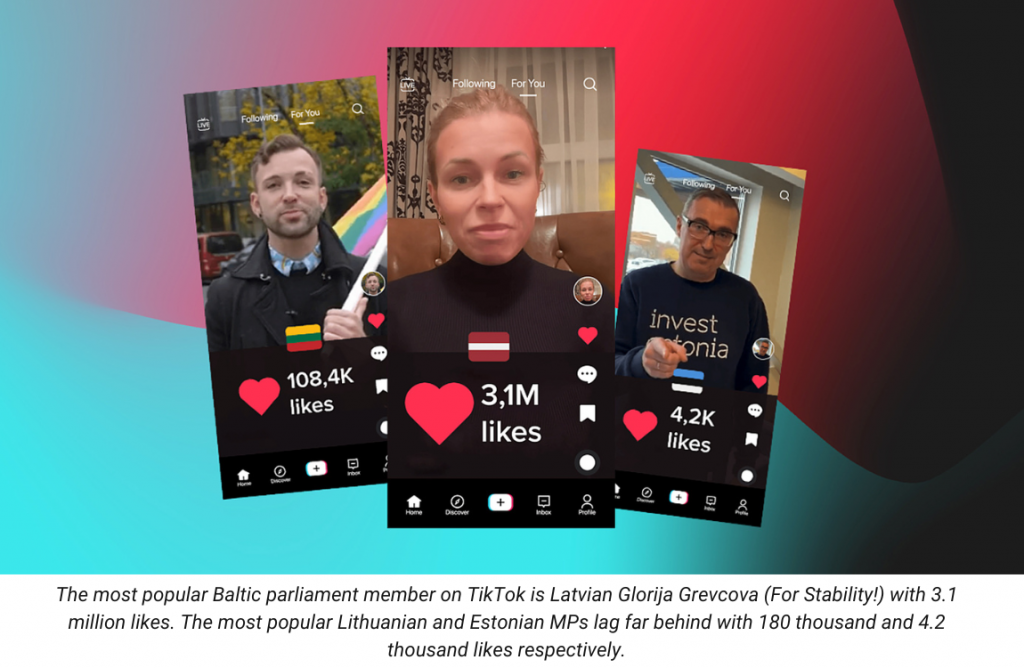
TikTok – one more platform for spreading Kremlin’s propaganda
In Latvia, this platform is actively used by populists who spread messages favorable to the Kremlin. Since the beginning of the war in Ukraine the Latvian State Security Service has started seven criminal investigations for supporting Russia’s war or for incitement of hatred on TikTok. The VDD states that every day they come across hundreds of comments expressing support to Russia on social media, but the decision to start investigation is based on “individual’s motivation, how systematically and how often it is done, and what are the consequences”.
There are no such similar tendencies and criminal cases in Lithuania and Estonia.
In Estonia, police had identified four problematic accounts which were calling to deport the Baltic government, asked Russia’s president to help to kill the Estonian Prime Minister, praised Russia’s actions in Ukraine and insulted Ukrainians, as well as demeaned Estonians. However, Estonian police classifies it as “misdemeanors” and the only punishment is to delete the videos in front of the police officers.
In Lithuania, police do not specify whether there have been any cases of disinformation or hate speech detected on TikTok or other platforms. Police representative Ramūnas Matonis explained that the cases of disinformation are very difficult to prove. Report about each incident has to be sent for evaluation to the Inspectorate of Journalists’ Ethics and only when police get confirmation that content can be evaluated as disinformation, it can act upon it.
The account spreading Kremlin propaganda and targeting selected Lithuanian politicians (mostly individuals known for their liberal views) that has gained most traction has been the unidentified user BlackCatNews with 426.1K likes.
Next in line is Saulius Gintautas, a well-known political and public figure from the Rokiškis municipality, who has several accounts to spread Russian propaganda and anti-western sentiment. The account he runs in Russian (306.7K likes) is more popular than the three that we found in Lithuanian (with 19.1K likes).
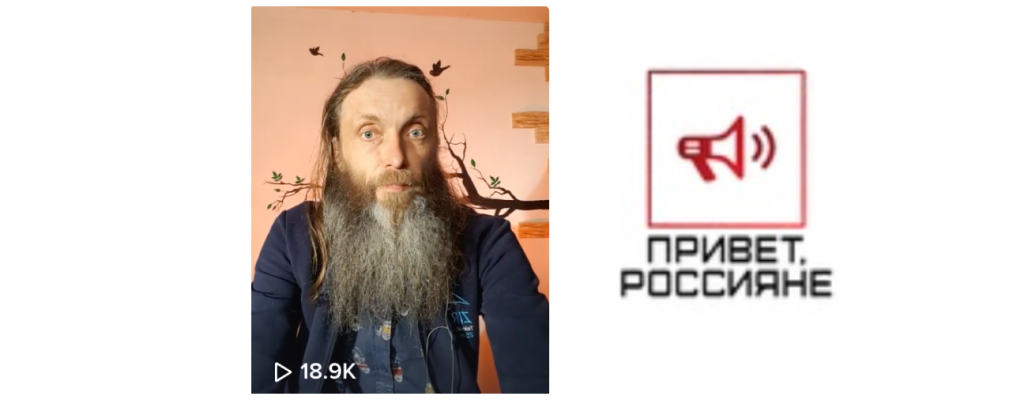
Other well-known pro-Russian figures in Lithuania, such as Vaidas Lekstutis and Laurynas Ragelskis, also have TikTok accounts. Although they don’t have a large following on the platform, they are active on all social media platforms and have their own websites—bukimevieningi.lt and ldiena.lt.
Information warfare expert Nerijus Maliukevičius says that organisations monitoring and researching disinformation don’t pay much attention to TikTok because, comparatively, the platform is not as popular as other social media are. In Lithuania Facebook still plays a bigger role in spreading disinformation than TikTok.
“On the other hand, there are no convenient tools to analyse TikTok apart from “pure” human resources directly observing the [information] traffic (..) The discussion becomes more complicated when we realise that TikTok is a social network from an authoritarian country, that is, China,” Maliukevičius adds. “I think the biggest threat is the one posed to those immersed in TikTok algorithms—young people and the Russian-speaking public. However, attention should be paid to monitoring and, ultimately, regulating this tool if it is aggressively used to spread disinformation.”
About Re:Baltica
The Baltic Center for Investigative Journalism Re:Baltica is a non-profit organization that produces investigative journalism in the public interest. Founded in 2011, organisation focuses on in-depth investigations of socially important issues in the Baltic region, such as corruption, crime, finances, entrepreneurship, health, human rights and disinformation. Re:Baltica‘s investigations and journalists have been quoted on The Guardian, The Washington Post, Financial Times, Mediapart, Meduza, Buzzfeed, BBC, TV Rain, Helsingin Sanomat, YLE and many other international media outlets.
The article was prepared on the basis of a review conducted by Re:Baltica on the use of TikTok in the Baltic States.
Links to Re:Baltica review in English:
Is TikTok a Gateway to Politics in the Baltics? For Now, Only in Latvia